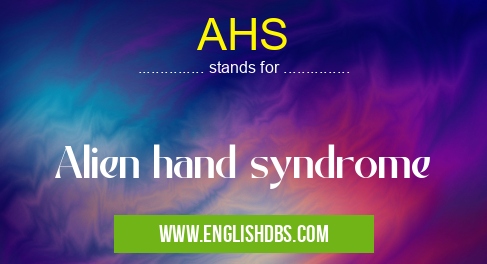What does AHS mean in REHABILITATION
Alien hand syndrome (AHS) is a rare neurological disorder characterized by involuntary movements of one or both hands or arms. The affected limb may feel or appear like it has a mind of its own, performing actions independently of the person's conscious control.

AHS meaning in Rehabilitation in Medical
AHS mostly used in an acronym Rehabilitation in Category Medical that means Alien hand syndrome
Shorthand: AHS,
Full Form: Alien hand syndrome
For more information of "Alien hand syndrome", see the section below.
Causes
AHS can result from various brain injuries or disorders, including:
- Stroke
- Brain tumors
- Multiple sclerosis
- Parkinson's disease
- Traumatic brain injury
Symptoms
- Involuntary, purposeless movements of one or both hands or arms
- Feeling of detachment or foreignness of the affected limb
- Difficulty controlling or stopping the movements
- Interference with daily activities like eating, dressing, or writing
Diagnosis
Diagnosing AHS involves a comprehensive medical history, physical examination, and neurological tests, such as:
- Magnetic resonance imaging (MRI) or computed tomography (CT) scan of the brain
- Electroencephalography (EEG) to monitor brain activity
- Electromyography (EMG) to assess muscle activity
Treatment
There is no cure for AHS, but treatment options aim to minimize symptoms and improve functionality. These may include:
- Medications to reduce involuntary movements
- Physical therapy to improve coordination and control
- Occupational therapy to assist with daily activities
- Behavioral strategies to manage unwanted behaviors
Essential Questions and Answers on Alien hand syndrome in "MEDICAL»REHABILITATION"
What is Alien Hand Syndrome (AHS)?
Alien Hand Syndrome (AHS) is a rare neurological condition characterized by the involuntary and purposeless movements of one or both hands. It feels as if the hand has a mind of its own.
What causes AHS?
AHS is most commonly caused by damage to the corpus callosum, a thick band of nerve fibers that connects the two hemispheres of the brain. This damage can occur due to stroke, brain tumors, or traumatic brain injury. AHS can also be a side effect of certain medications, such as antipsychotics and anticonvulsants.
What are the symptoms of AHS?
Symptoms of AHS can vary depending on the severity of the condition. Common symptoms include:
- Involuntary movements of one or both hands
- Inability to control the movements of the affected hand(s)
- Difficulty performing simple tasks, such as eating or writing
- A feeling that the affected hand(s) are not part of the body
- Hallucinations or delusions involving the affected hand(s)
How is AHS diagnosed?
AHS is diagnosed based on a physical examination, medical history, and a neurological evaluation. The doctor may also order an MRI or CT scan of the brain to rule out other possible causes of the symptoms.
How is AHS treated?
There is no cure for AHS, but treatment can help to manage the symptoms. Treatment options may include:
- Physical therapy to improve control of the affected hand(s)
- Occupational therapy to help with daily activities
- Medications to reduce involuntary movements
- Surgery to disconnect the corpus callosum in severe cases
Final Words: Alien hand syndrome is a complex neurological condition that affects hand and arm movements. While it can be challenging for individuals and their families, appropriate medical evaluation, diagnosis, and treatment can help manage symptoms and improve quality of life.
AHS also stands for: |
|
| All stands for AHS |
